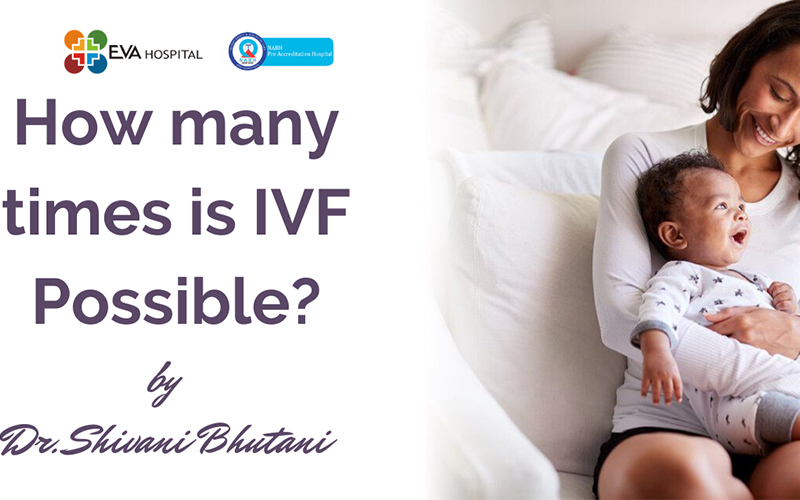[vc_row el_class=”cstm_container”][vc_column][vc_column_text]Pregnancy and parenting a baby are a dream for many. It becomes a fond dream when you are unable to conceive and get pregnant.
Thanks to modern science and technology, there are many new ways in which you can target to get pregnant and raise a baby.
The infertility drugs and various procedures of ART- Assisted Reproductive Techniques are a scientific blessing to achieve the state of pregnancy.
The most common ART procedures are intrauterine insemination (IUI), In-vitro fertilization (IVF), sperm or egg donation, and Intra-cytoplasmic
Sperm Injection (ICSI). However, the most commonly used procedure with a high success rate is In-vitro fertilization (IVF). Over 200000 babies were conceived with IVF successfully in the US alone in a year and you are no exception.
“Don’t give up!” advocates Dr. Shivani Bhutani, the best gynecologist of Punjab, from EVA Hospital, “With calculated actions and appropriate treatments, pregnancy can be achieved.”
How successful is IVF Treatment?
IVF is the process where the woman’s eggs are extracted and fertilized under controlled laboratory conditions and then the resulting embryo is transferred into the women’s uterus through the cervix.
If you have been trying to get pregnant in natural ways and haven’t been successful, with further investigation, the doctor will examine the causes of infertility. The most likely infertility causes are as follows:
- Premature ovarian failure
- Ovulation disorders
- Hormonal imbalances
- Endometriosis
- Blocked Fallopian Tube
- PCOS
- Male infertility (in case of low sperm count, poor motility, and poor quality sperm)
- Failed IUI treatment cycle
- Unexplained infertility
Patients with any of the above lacunas have known to benefit from the cycles of IVF. Usually, patients around the age of 40 are known to have recommended IVF at the earliest.
IVF has been successful in all countries in the world. The Centre for Disease Control and Prevention (CDC) reports about 4 million births per year in the US. This implies that nearly 1% to 2% of births in the US are IVF babies. This clearly signifies that IVF and other ART techniques are the new buzzwords in combating infertility.
What Are the Factors That Affect the Success of Ivf?
There are a couple of factors affecting the success of IVF. Dr. Shivani Bhutani says, “The age of the woman is a predominant factor in the success of IVF.
Patients between the age brackets of 35-41 are more likely to get a successful IVF. There is a 4% success rate of patients who are over 42 years of age. Chances of success of IVF are higher at a younger age than older women with fewer eggs or poor quality eggs.
The fertility problem or the reason for infertility also determines how quickly the patient can get pregnant. Sometimes a large dosage of ovarian stimulation drugs is needed to be administered to patients with ovarian dysfunction. Male infertility problems and unexplained infertility may, however, take longer than anticipated.
Previous pregnancy, miscarriages, age of the donor in case of donor eggs and the duration of time over which the couple has been infertile have been a few other factors affecting the success of IVF.
Dr. Bhutani strongly says apart from medical abnormalities, the lifestyle of the patient plays an important role in determining the success of IVF.
Overweight or underweight women, women who smoke, women who do not exercise or eat healthy have higher chances of prolonged infertility.
How Many Cycles of Ivf Are Recommended?
Depending on the factors mentioned above and the expertise of the doctor, the numbers of cycles of IVF vary from individual to individual.
The cost of IVF hovers between Rs.90000 to Rs.3,00,000 depending on the city and the facilities at the clinic. Research has shown that about 70% of the patients are usually successful after 6 or more cycles of IVF if the woman is about 40 years in age.
Dr. Bhutani recommends patients stop using their own eggs after 3-4 failed IVF cycles. The woman may not be producing sufficient eggs or eggs of good quality, so the doctor usually advises them to go for the donor eggs.
Dr. Shivani is known among her patients to endorse optimism and positivity and not to lose hope in such despairing times. She understands that the patient spends a fortune in each cycle and also adds to the mental agony with each failed IVF cycle. So she always advises her patients with empathy and positivity.
“There is no guarantee with each cycle and the process and the results vary from person to person,” says the best gynecologist in Punjab, dr. Bhutani.
You may be lucky to get pregnant in the first IVF cycle, but it may not hold true for any other couple. Dr. Bhutani says an average couple may need tentatively six IVF cycles before entering the threshold of parenthood.
Final Words
Pregnancy is a dream for many couples and lets the best team on board turn your dream into reality. Analyze the facilities the clinic provides and study the expertise of the gynecologist you plan to approach.
With finesse in skills and expertise and the best modern facilities at EVA hospital, Dr. Shivani Bhutani is the most trusted name for IVF in Punjab. Seek the help of the best team at EVA and get your queries solved and let the aim of parenthood achieve a real shape.[/vc_column_text][/vc_column][/vc_row]




